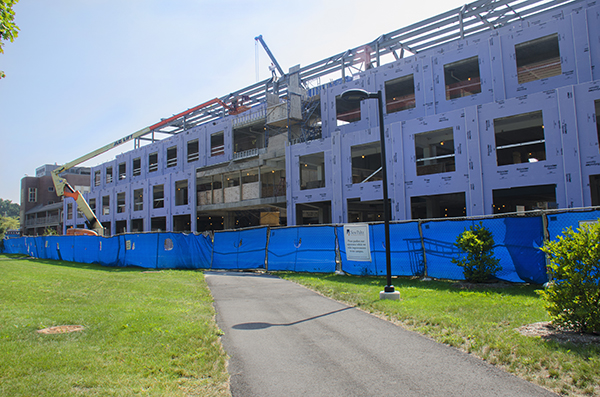

Several construction projects at SUNY New Paltz are set to continue, and resume, as early as next week.
In his most recent State of the College Address, President Donald Christian said renovations for Wooster Science Building, the Sojourner Truth Library, Lefevre Hall and construction of a new residence hall are currently in the works.
“The Wooster renovation is progressing well. We have the go-ahead to resume our library renovation, and the construction of both the new science building and a new residence hall,” Christian said. “On the last day of the fall semester, students will move out of Lefevre residence hall, which we will renovate before the start of the 2014 academic year.”
Assistant Vice President for Facilities Management John Shupe said the school has “about $100 million available” for construction projects, including the construction of a transportation hub at the Route 32 parking lot and a new science building.
Shupe said the $36 million Wooster renovation has moved on from the demolition phase and just recently made its way into the next phase.
“The project is ongoing, and we’re now able to see the actual renovations,” he said. “The penthouse that’s going to be constructed on top is becoming visible. We’re very excited about it.”
Once Wooster’s renovations are completed, the building will include additional classroom space, faculty offices, a food court and dining area.
“We want to hit our time frame on Wooster as best we can,” Shupe said. “Since it’s an academic building, that’s several departments who are currently in need of space. Once Wooster is done, those faculty members will have access to their offices and classrooms again.”
Lefevre Residence Hall will be the second suite hall to undergo renovations after the construction of Crispell, which opened just prior to the fall 2011 semester. Construction of the hall will begin the last day of the fall semester once all students have left campus.
The renovation, which will cost $14 million from the Dormitory Authority of the State of New York [DASNY], is set to take seven months to complete.
Shupe said it’s rare for renovation projects to be completed within seven months — Crispell being one of the first. Due to the school’s increased need for housing in the past several years, Shupe named Lefevre as the top renovation concern for the school.
“We expect everything to go well and to go smoothly, but it is extremely challenging to complete a renovation like that in seven months time,” he said. “We already triple many students as it is, and if we aren’t finished by the time we need the hall to be done, that’s 200 less beds on campus.”
Shupe said the Lefevre renovation should be completed by late July or early August of next year.
Starting late winter or early spring of next year, construction on a transportation hub at the south entrance of the Route 32 parking lot will begin. Shupe said the project will cost $1 million and will include the construction of a bus shelter and most likely a taxi stand.
“Right now the large trailway buses can’t pull in there because there isn’t enough room for them to turn,” Shupe said. “We’ll be available to stack four or five buses in [the bus shelter] at once. All of our transportation needs can be met at that one location. We think it will be a real convenient alternative.”
Renovations for Sojourner Truth Library will cost $8 million and will resume during the spring 2014 semester, with an end date set for fall 2015.
The new residence hall, which will be built where the west student parking lot currently stands, will begin this semester and has an expected end date for the fall 2015 semester.
Construction on the new science building is set to be finished by the fall 2016 semester.
Even though the campus will be undergoing construction projects for the next three years, and possibly longer if construction is halted, Christian said he would rather there be construction than nothing at all.
“We will experience ongoing disruption from construction and renovation this year, but I will remain steadfast in my view that the only thing worse than a campus torn up by construction is one that is not,” he said.
